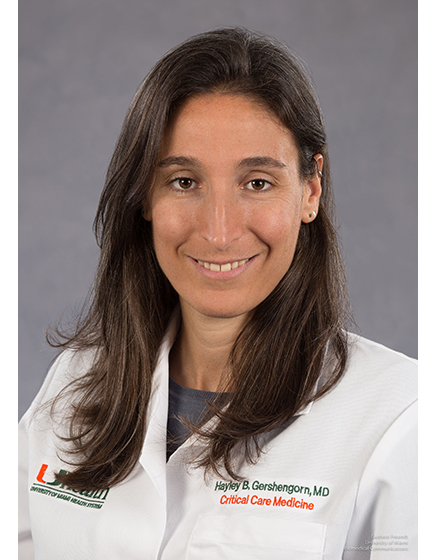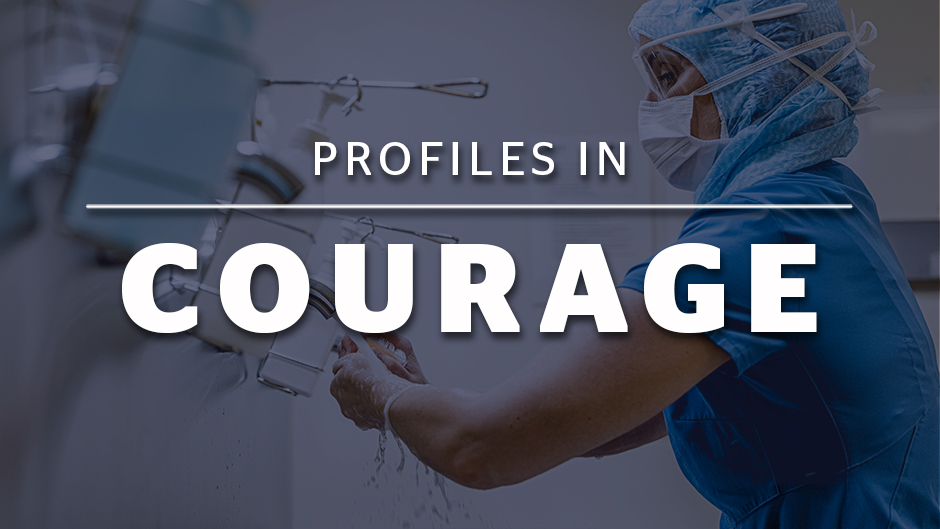 Before the COVID-19 pandemic, Dr. Hayley Beth Gershengorn, associate professor of clinical medicine at UHealth, spent a third of her time on her passion—research—focusing on how intensive care unit practices and staffing impact morbidity and mortality outcomes of critically ill patients. “It’s the thing I think I am best at and one of the things I love,” said Gershengorn.
Before the COVID-19 pandemic, Dr. Hayley Beth Gershengorn, associate professor of clinical medicine at UHealth, spent a third of her time on her passion—research—focusing on how intensive care unit practices and staffing impact morbidity and mortality outcomes of critically ill patients. “It’s the thing I think I am best at and one of the things I love,” said Gershengorn.
Today, Gershengorn has put that work on hold, trading data analysis for scrubs and PPE as she cares for critically ill patients with COVID-19 at the UHealth Tower.
“When I’m on service—which has been eight days so far—I am the physician in charge of caring for critically ill patients on ventilators,” said Gershengorn.
We caught up with Gershengorn on an off-service day to learn about her recent experience. She responded to our questions and shared insight.
Let’s start with positive news. Can you share any silver linings that have come out of this difficult situation?
My last four days in the COVID ICU were the best four days that I’ve spent as an intensivist. The team was fantastic; we were all working together and totally on the same page. We were making a real noticeable difference in the lives of young people who should get through this (if we can help them) to live 50-60 years more.
I saw a nurse teach a mother struggling to use her cell phone to connect with her daughter, who had just been placed on a ventilator. It was truly inspiring. We have also developed some new protocols that will serve our ICU patients long after the pandemic.
I have also seen true collaboration across sites. I have friends from all over the country who are actively sharing their lessons-learned with us and vice-versa. Colleagues have set up conference calls for us with providers in Italy to learn from their experiences. Normally, especially in the U.S., care is very “local” (hospitals do not share with one another). This situation has been the opposite.
What’s the most significant change to your role since the onset of COVID-19?
It’s working with patients who are otherwise very healthy; and now, unfortunately, they are faced with acute critical illness. This is a change for us, as many of our typical ICU patients are more sick at baseline. This makes the impact of our interventions, if they work out well for patients, all the more meaningful. Hopefully, we return them to a fairly normal life for many years to come.
What are some of the biggest challenges that you face in your current role?
It’s hard not being able to talk to families face-to-face, especially when patients are on multiple life supporting machines. It is often helpful for families to see physicians and their loved one, both for their comfort and to fully grasp what the patient is facing. Also, ICU care is a team effort that includes nurses, doctors, respiratory therapists, and others. We each have different roles and play to our strengths under normal circumstances. With more limited physical access to patients (to limit exposure risk), we are taking over some of each other’s roles, which is both challenging and necessary. Finally, being unable to routinely reassess patients as frequently as we normally would—because of exposure constraints—is challenging.
How are you managing on a personal level?
My family and I are very fortunate. My husband and I live in a house, and we have access to an apartment, which is otherwise empty, a few blocks away. When I’m seeing patients, my husband frequently stays in the apartment. When he is home, we stay in different bedrooms and use different bathrooms. I have been connecting with friends over Zoom; and if possible, I speak with my parents, who live in D.C., daily. If I’m on service, I let my family know via text that I’m OK. They are worried, but we are making do.
Hayley Beth Gershengorn is an associate professor and interim vice chief of the Division of Pulmonary and Critical Care Medicine at the University of Miami, Miller School of Medicine. She received her medical degree from Harvard Medical School and completed a residency in internal medicine at New York Presbyterian Hospital-Cornell and a fellowship in pulmonary and critical care medicine at New York Presbyterian Hospital-Columbia. She is an associate editor for critical care of the Annals of the American Thoracic Society, on the program committee for critical care for the American Thoracic Society, and chair-elect for the Internal Medicine Section of the Society of Critical Care Medicine.
Wearing many hats, Gershengorn also serves as the executive director for quality improvement at the University of Miami Hospitals and Clinics, where she is involved in drafting procedures to standardize care delivery, exposure mitigation, and safety. As vice chief of the pulmonary/critical care division, she is working on a staffing strategy to care for expected surges in ICU patients.

